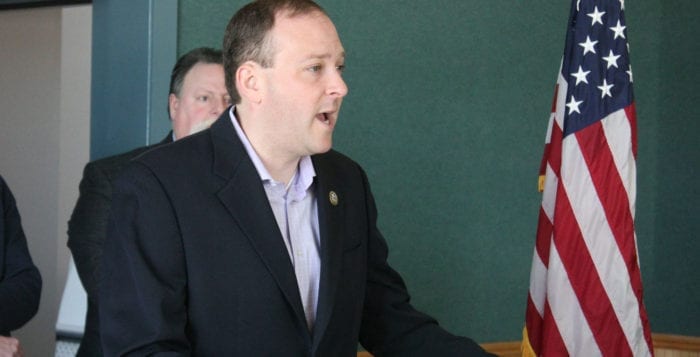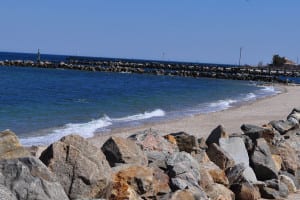Zeldin calls for Long Island Sound, Estuary program funding

The quality of Long Island waters has been on the mind of elected officials from all levels of government recently, and a representative from the federal government has joined the fray, calling for more funding for two Environmental Protection Agency programs.
“There’s much we can do to improve water quality in the Long Island Sound and National Estuary and I’ll continue working in congress to ensure our waterways are preserved for generations to come,” U.S. Rep. Lee Zeldin (R-Shirely) said during a press conference March 13.
Southold Town Council members and residents from the 1st Congressional District gathered at Veterans Memorial Park in Mattituck as Zeldin called on the federal government to fully fund at least $10 million to the Long Island Sound Study and $26.5 million to the National Estuary Program in its upcoming appropriations process at the end of April, and also to support the passage of the Long Island Sound Restoration and Stewardship Act. He said funding for the two EPA programs is essential to address urgent and challenging issues that threaten the ecological and economic well-being of Long Island’s coastal areas, such as nitrogen, harmful algae blooms and flooding or wetland loss.

“Over the years, water quality around Long Island has suffered from pollution, overdevelopment and other negative impacts…and I’m calling on my colleagues to make sure these programs are fully supported and funded, and certainly not eliminated,” Zeldin said, highlighting the significant impacts each of the programs have had on the region.
The Long Island Sound is one of our natural treasures, the congressman said, and is a precious feature of the life, culture and economy of more than 9 million people living in the coastal communities around it. He voiced his admiration of the Long Island Sound Study for its dedication to water quality and wetlands restoration in addition to local conservation projects to restore beaches and protect wildlife.
He called the National Estuary Program “an important EPA wetlands protection program for 28 estuaries in the U.S.,” two of which being Long Island Sound and Peconic Bay. The program was established by the Clean Water Act in 1987 to provide grants to states where nationally significant estuaries are threatened.
Zeldin said he will continue to work alongside Democrats and Republicans in the region to secure the funding as he did to stop President Barack Obama’s (D) proposed 22 percent cut to the Long Island Sound Study in 20
The Long Island Sound Restoration and Stewardship Act, he said, was introduced at the last congress by himself and former 3rd District U.S. Rep. Steve Israel (D-Huntington) and will propose tens-of-millions of dollars in funding per year through 2020 for a water quality and shore restoration program. Zeldin plans to reintroduce the bill during this congressional session.
Setauket Harbor Task Force Trustee George Hoffman voiced support for Zeldin and his call for funding to protect local waters.
“With Congressman Zeldin’s strong advocacy and leadership, the Long Island Sound Study, a consortium of federal, state and environmental organizations has turned the corner on cleaning up the water in LI Sound and its harbors and bays.”
—George Hoffman
“With Congressman Zeldin’s strong advocacy and leadership, the Long Island Sound Study, a consortium of federal, state and environmental organizations has turned the corner on cleaning up the water in LI Sound and its harbors and bays,” he said. “Federal funding is critical to survival of this important and productive estuary.”
Southold Town Supervisor Scott Russell spoke briefly in response to Zeldin’s longtime presence in the area.
“The people of the East End and people of the first congress have made it clear time and time again that the environment is a top priority and the congressman has been a zealous advocate on behalf of us, on behalf of the environment, and on behalf of our natural resources,” Russell said. “Time and time again, he’s disproved the myth that Republicans aren’t friends of the environment…Republicans are and he is.”
Councilman Bob Ghosio took to the podium to speak about the importance of the proposed funding.
“Talking about nitrogen in the bays and creeks and knowing the Long Island Sound and estuaries [here], particularly in Southold are what drives our economy, our tourism, our jobs and our recreation, just tells me how important this is,” Ghosio said. “Getting the funds to keep this area healthy for the future for my kids, my grandkids and generations thereafter is very important to us.”
When asked by a resident what he thinks of some of his Republican colleagues advancing toward eliminating EPA entirely, Zeldin reminded those in attendance he voted against a 17 percent cut to the EPA last year.
“There are 535 members of congress, all with very different ideologies and backgrounds and you get a whole lot of diversity on these issues and so I have a lot of colleagues who would support completely eliminating the EPA altogether,” Zeldin said. “But again, I voted against the 17 percent cut so to ask me how I feel about a 100 percent cut, there’s some precedent in it.”






